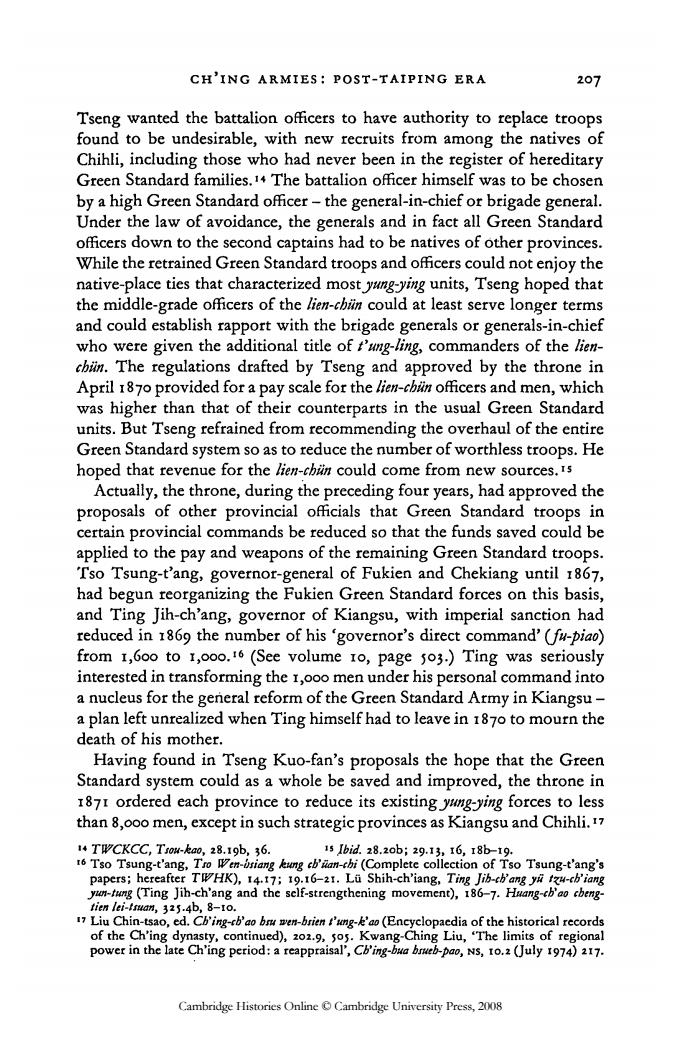正在加载图片...

CH'ING ARMIES:POST-TAIPING ERA 207 Tseng wanted the battalion officers to have authority to replace troops found to be undesirable,with new recruits from among the natives of Chihli,including those who had never been in the register of hereditary Green Standard families.1+The battalion officer himself was to be chosen by a high Green Standard officer-the general-in-chief or brigade general. Under the law of avoidance,the generals and in fact all Green Standard officers down to the second captains had to be natives of other provinces. While the retrained Green Standard troops and officers could not enjoy the native-place ties that characterized most yung-ying units,Tseng hoped that the middle-grade officers of the lien-cbiin could at least serve longer terms and could establish rapport with the brigade generals or generals-in-chief who were given the additional title of t'ug-ling,commanders of the lien- chiin.The regulations drafted by Tseng and approved by the throne in April 187o provided for a pay scale for the lien-cbiin officers and men,which was higher than that of their counterparts in the usual Green Standard units.But Tseng refrained from recommending the overhaul of the entire Green Standard system so as to reduce the number of worthless troops.He hoped that revenue for the lien-cbiin could come from new sources.'s Actually,the throne,during the preceding four years,had approved the proposals of other provincial officials that Green Standard troops in certain provincial commands be reduced so that the funds saved could be applied to the pay and weapons of the remaining Green Standard troops. Tso Tsung-t'ang,governor-general of Fukien and Chekiang until 1867, had begun reorganizing the Fukien Green Standard forces on this basis, and Ting Jih-ch'ang,governor of Kiangsu,with imperial sanction had reduced in 1869 the number of his 'governor's direct command'(fu-piao) from 1,6oo to I,oo0.16(See volume Io,page jo3.)Ting was seriously interested in transforming the I,ooo men under his personal command into a nucleus for the general reform of the Green Standard Army in Kiangsu- a plan left unrealized when Ting himself had to leave in 187o to mourn the death of his mother. Having found in Tseng Kuo-fan's proposals the hope that the Green Standard system could as a whole be saved and improved,the throne in 187I ordered each province to reduce its existing yung-ying forces to less than 8,ooo men,except in such strategic provinces as Kiangsu and Chihli.7 1 TWCKCC,Tsou-kao,28.19b,36. 15bid.28.2ob;2913,6,18b-19. t6 Tso Tsung-t'ang,Tro Wen-isiang eung eb'dan-chi (Complete collection of Tso Tsung-t'ang's papers;hereafter TWHK),14.17;19.16-21.Lu Shih-ch'iang,Ting Jib-ch'ang yf fzu-cb'iang yto-tung (Ting Jih-ch'ang and the self-strengthening movement),186-7.Huang-cb'ao cbeng- tien lei-fruan,325.4b,8-10. 7Liu Chin-tsao,ed.Ch'ing-cb'ao bru wen-brien 'ng-'ao(Encyclopaedia of the historical records of the Ch'ing dynasty,continued),202.9,sos.Kwang-Ching Liu,'The limits of regional power in the late Ch'ing period:a reappraisal',Ch'ing-bua breb-pao,Ns,to.2(July 1974)217. Cambridge Histories OnlineCambridge University Press,2008CH ING ARMIES: POST-TAIPING ERA 207 Tseng wanted the battalion officers to have authority to replace troops found to be undesirable, with new recruits from among the natives of Chihli, including those who had never been in the register of hereditary Green Standard families.14 The battalion officer himself was to be chosen by a high Green Standard officer - the general-in-chief or brigade general. Under the law of avoidance, the generals and in fact all Green Standard officers down to the second captains had to be natives of other provinces. While the retrained Green Standard troops and officers could not enjoy the native-place ties that characterized mostyung-ying units, Tseng hoped that the middle-grade officers of the lien-chun could at least serve longer terms and could establish rapport with the brigade generals or generals-in-chief who were given the additional title of t'ung-ling, commanders of the lienchun. The regulations drafted by Tseng and approved by the throne in April 1870 provided for a pay scale for the lien-chun officers and men, which was higher than that of their counterparts in the usual Green Standard units. But Tseng refrained from recommending the overhaul of the entire Green Standard system so as to reduce the number of worthless troops. He hoped that revenue for the lien-chun could come from new sources.15 Actually, the throne, during the preceding four years, had approved the proposals of other provincial officials that Green Standard troops in certain provincial commands be reduced so that the funds saved could be applied to the pay and weapons of the remaining Green Standard troops. Tso Tsung-t'ang, governor-general of Fukien and Chekiang until 1867, had begun reorganizing the Fukien Green Standard forces on this basis, and Ting Jih-ch'ang, governor of Kiangsu, with imperial sanction had reduced in 1869 the number of his 'governor's direct command' (fu-piao) from 1,600 to 1,000.l6 (See volume 10, page 503.) Ting was seriously interested in transforming the 1,000 men under his personal command into a nucleus for the general reform of the Green Standard Army in Kiangsu - a plan left unrealized when Ting himself had to leave in 1870 to mourn the death of his mother. Having found in Tseng Kuo-fan's proposals the hope that the Green Standard system could as a whole be saved and improved, the throne in 1871 ordered each province to reduce its existing yung-ying forces to less than 8,000 men, except in such strategic provinces as Kiangsu and Chihli." '• TWCKCC, Tsou-kao, 28.19b, 36. " Ibid. 28.20b; 29.13, 16, 18ID-19. 16 Tso Tsung-t'ang, Tso Wen-bsiang kung cb'iian-chi (Complete collection of Tso Tsung-t'ang's papers; hereafter TH^HK), 14.17; 19.16-21. Lii Shih-ch'iang, Ting Jib-cb'angyS t^u-ch'iang yun-tung (Ting Jih-ch'ang and the self-strengthening movement), 186-7. Huang-ch'ao cbengtitn Iti-tsuan, 325.4b, 8-10. 17 Liu Chin-tsao, ed. Ch'ing-cb'ao bsu wen-bsien t'ung-k'ao (Encyclopaedia of the historical records of the Ch'ing dynasty, continued), 202.9, 505. Kwang-Ching Liu, 'The limits of regional power in the late Ch'ing period: a reappraisal', Cb'ing-bua bsueb-pao, NS, 10.2 (July 1974) 217. Cambridge Histories Online © Cambridge University Press, 2008